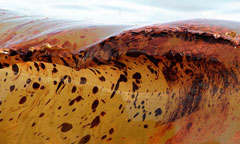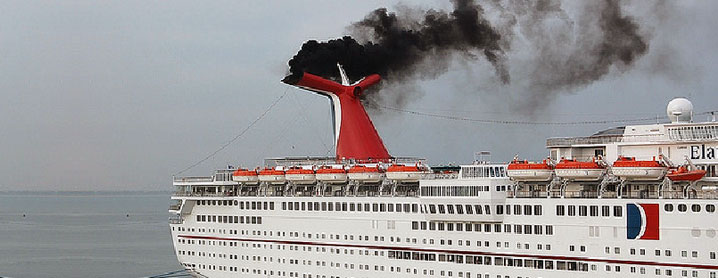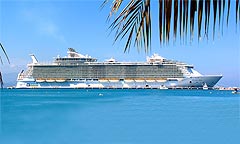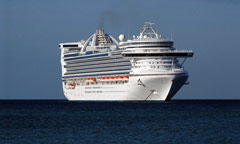The cruise ship industry has experienced an enormous growth in terms of popularity, size and variety of destinations in the last years, with bigger and more luxurious ships designed to meet the also growing demand for cruising as a holiday option that offers beauty, adventure, relaxation and entertainment to passengers from across the world.
The splendour of tourist destinations and their natural beauty are essential to maintain such demand, so the future of the cruise industry depends on and is inextricably linked to environmental performance and compliance.
Although the cruise industry represents just a small portion of the international maritime activity, and environmental issues associated with it is not unique to this sector, cruise ships and their passengers and crews generate a more significant volume of waste and pollutant emissions, both while underway and docked in port, with an also more important effect on the subset of ports and coastal areas along cruise routes.
As cruise ships get larger and more luxurious, they also produce more waste. Recently, U.S. Environmental Protection Agency estimated that, during a one-week voyage, a large cruise ship with capacity for 3,000 passengers and crewmembers can produce around 210,000 gallons (794,850 L) of sewage stream, one million gallons (3.785 million L) of greywater, 25,000 gallons (95,000 L) of oily bilge water, 150 gallons (568 L) of hazardous wastes, 8 tons of solid waste and a difficult-to-calculate quantity of air pollutants, which must be multiplied by the more than 200 cruise ships currently plying the world’s waterways 365 days a year.
In fact, it has been suggested that cruise ships constitute about 77% of the marine pollution world wide.
These wastes represent a significant source of pathogens and toxic substances that, if not properly treated and disposed of, can have a serious effect on human health, including disturbance and destruction of fishing grounds and precious marine ecosystems such as coral reefs.
The most worrying aspect of this whole situation is that cruise ship waste disposal is highly unregulated, and waste can be dumped just few short miles off shore (returning later to coasts by ocean currents) rather than installing appropriate onboard treatment systems.
Formerly, discharges from most cruise ships usually exceed the water quality standards established by national authorities and international associations and organisms in relation to concentration of bacteria, metals, hydrocarbons and plastics. In many cases, there was no monitoring, no enforcement and no recourse for local authorities if cruise companies violate the existing pollution standards.
Nevertheless, the repeated public exposés of environmental abuses committed by cruise companies, which include viral and bacterial epidemics, are a serious problem that have caused these organizations severe embarrassment and lawsuits, indicating the need for more strict monitoring of waste discharges, and pressing the industry to adhere to a new ethical and procedural code in the application of more advanced waste treatment technologies meeting more rigorous environmental control standards and procedures.
In this regard, especial attention must by paid to the pressure from coastal localities and areas without large commercial port infrastructures, which complain about air quality problems derived from gas emissions produced by shipboard diesel engines and incinerators while in port.
Although the cruise industry unabashedly promotes itself as environmentally friend, the reality is that there is a long history of breaking the law, seeking all kinds of concessions and non-regulation by lobbying and local regulators; in addition to the progressive accumulation of hundreds of pollution violations, which have resulted in higher-level enforcement actions and the payment of millions of dollars in environmental fines for illegally dumping water waste, garbage and other toxic waste into coastal and international waters.
These cases have involved both small and large cruise companies in a diversity of surrounding circumstances and volume of discharge, which also varies widely, from tons of oil and solid garbage to drops of oil-based paint that spilled into the water during painting of a ship’s hull.
Regarding the causes, in some cases environmental incidents is accidental, resulting from mere human or mechanical error, such as many fuel-related discharge cases involving cruise ships loading fuel in port. In other cases, environmental damage is caused in circumstances that cannot be determined from the available information.
Finally, there have been companies involved in discharges that were judged to be intentional, including a number of cases in which cruise companies pled guilty to the wilful, regular and routine discharge of hazardous waste into the water, use of permanent piping that allowed oily waste to be discharged directly overboard, use of bypass pipes allowing employees to avoid pollution control devices and discharge liquid waste from the ship without first processing it, failure to keep of records of waste discharges, presentation of false record books during environmental pollution investigation procedures, etc.
As an example, we can mention the acknowledgment of guilt by Royal Caribbean executives for several episodes of disposal of toxic waste into the Alaska's Inland Passage waters in 1.999, which unleashed a flurry of activity among citizen-based environmental organizations, and an aggressive effort to legislate compliance to environmental regulations, promoting the development and implementation of diverse monitoring programs for cleaner air emissions and water and waste effluent from 2.000.

Pollutants and waste derived from activities aboard cruise ships, with different environmental repercussions.
Enter








